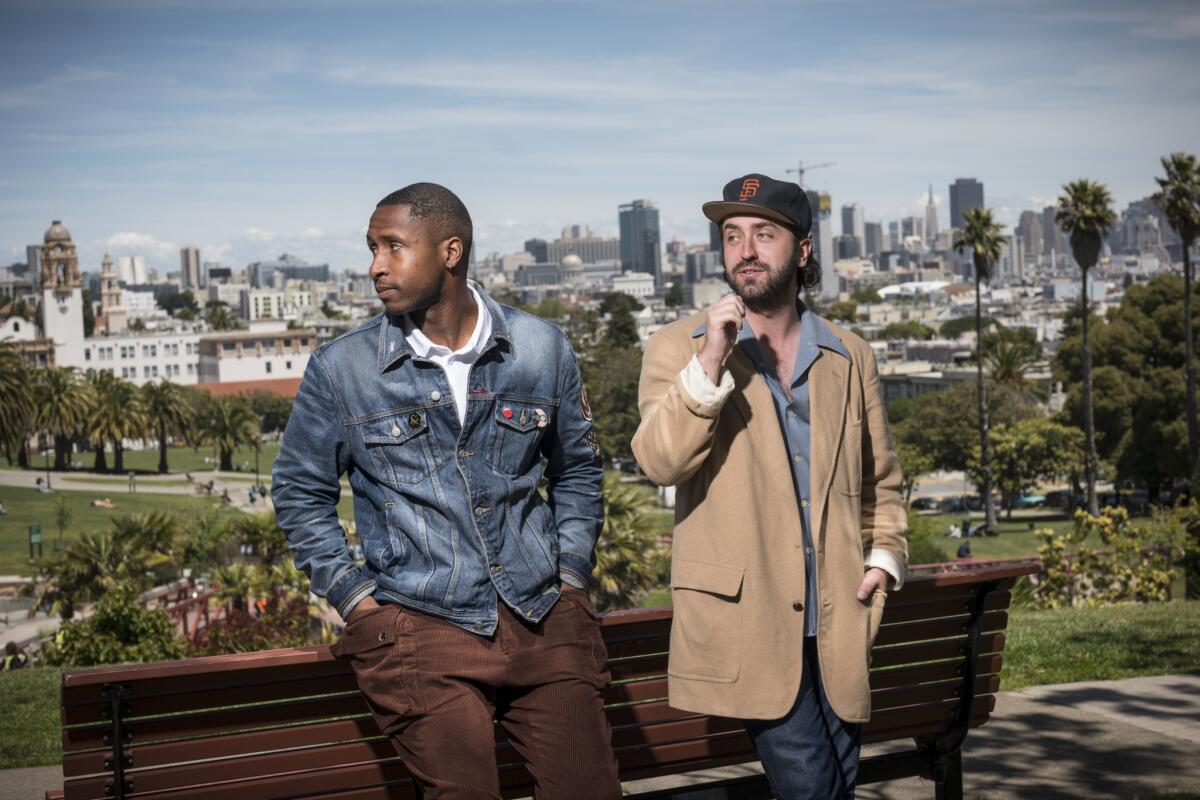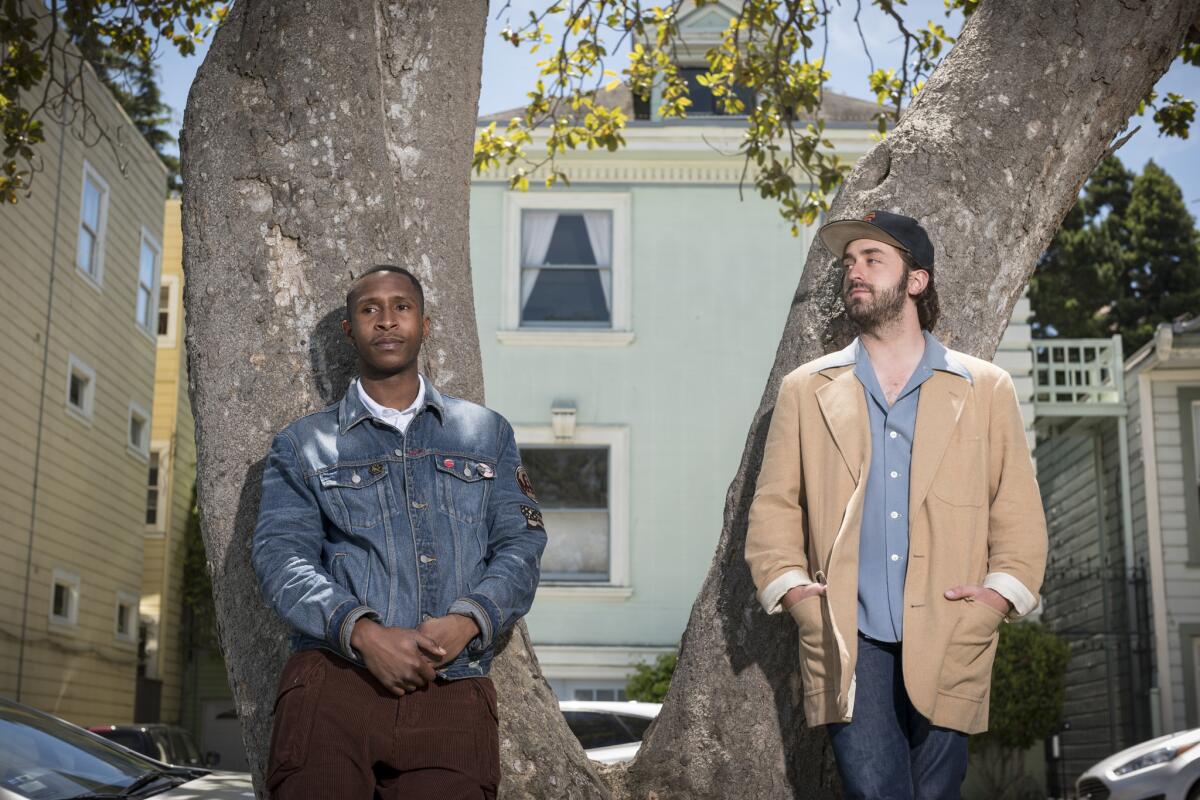‘Last Black Man in San Francisco’ and capturing the magic of home and fraternal love

San Francisco broke Jimmie Fails’ heart a long time ago.
The city he knew as a sanctuary for immigrants, free spirits, artists and oddballs no longer exists. A swell of wealth, tech companies and urban renewal has carved up much of his beloved city, rendering it unfamiliar and inaccessible to those without the fat wallets needed to afford today’s San Francisco.
Baby boomers, infants and minorities are virtually endangered species; Ubers, Lyfts and buses carrying Google and Apple workers clog the streets; the gap between the haves and have nots is crushing. Fails — like many inhabitants — yearns for his old paradise, the romantic city once known as the Paris of the West.
“The people who made the city what it is, I barely see them anymore. Everyone is gone, pushed out. We’re bitter, we’re jaded, but there’s not much I can do about it,” Fails says. “You just feel so disrespected when you see some of these white people who care more about dogs than black people.” (Oddly enough, San Fran is home to more dogs than children under 18.) The price to live in the city has skyrocketed so much that apartment listings often go viral for their shocking sticker prices, and there’s been a double-digit increase in homelessness just the last two years. The city, once a bastion for black culture, has seen its black population fall to about 5%.
The tension between the racial politics of gentrification, displacement, privilege and class stands at the center of Fails’ first feature film as a writer and actor, “The Last Black Man in San Francisco.” It’s a searing, semi-autobiographical drama he made with his childhood best friend, Joe Talbot, who directs the film, which won the special jury and directing awards at the Sundance Film Festival, where it premiered in January.
Loosely based on Fails’ upbringing, “Last Black Man,” which arrives in theaters Friday from the studio A24, is foremost a romance about a man and the childhood home that represents the devotion he has for his city and stands as a painful reminder of loss.
Wonderfully quirky, nuanced and profoundly resonant, the film follows struggling San Franciscans Jimmie (Fails as a slightly fictionalized version of himself) and Montgomery (Jonathan Majors), best friends who are on a mission to reclaim the Victorian home built by Jimmie’s grandfather in the Fillmore District where he grew up. “It’s a nuanced parade of experiences,” Majors says of the film.
See the most-read stories in Entertainment this hour »

Jimmie was hella brave to do this ... this movie is entirely emotionally real.
— Joe Talbot, director and co-writer of ‘The Last Black Man in San Francisco’ on the film’s star, Jimmie Fails
The multi-generational saga weaves meditations on estrangement, black masculinity and friendship into its tale and arrives after a decade of painstaking labor from Fails and Talbot, who is making his feature directing debut.
“Jimmie was hella brave to do this,” says Talbot, his thick Bay Area accent punctuating a conversation in which he and Fails fill in each other’s thoughts, the way friends who are more like siblings can. “It’s a lot to ever unpack your life, and this movie is entirely emotionally real — some of it comes from his life, some from mine [and] things in our friends’ lives.”
For Talbot and Fails, “Last Black Man” is a valentine to the city that raised them, albeit in very different circumstances, and the people who shaped them.
Fails lived in the Fillmore, an area rich with black and immigrant history, in an elegant but worn Victorian built by his grandfather until his family was forced out when he was 6 — the home a victim of a rough economy and drug abuse.
He bounced around the city with his father, taking up residence in housing projects or shelters or their car as the rest of the family flocked to cheaper, farther patches of the Bay.
While living in a group home as a teen, commuting to Catholic school, Fails met Talbot, a fifth-generation native who grew up outside the Mission District in a house of journalists. The pair bonded over frequent walks across Bernal Heights, where they could see the entire city as they talked for hours about music and film.
“Joe always had a camera in his hand; he comes from a family of artists. For me, film was my escape from my sometimes [crappy] life,” Fails says.
“Not to prop up my friend because he’s here,” Talbot interjects, “but he’s such a good storyteller. Just from day one. He’s such a naturally good writer. We thought the best way to combine all these things we loved — San Francisco, the people we grew up with and music — was to do a movie.”
The friends produced a concept trailer for “Last Black Man” that went viral in 2015 as the pair sought to crowdfund the film. The project eventually caught the attention of Brad Pitt’s Plan B, which produced the film.
This film, really, is a poem of what it is to be a black man. It’s about seeing each other, fully.
— Jonathan Majors
In the fictionalized account of Fails’ displacement, Jimmie moves to Hunter’s Point, a community in San Francisco’s southernmost edge where a generation of working-class folks are feeling pinched and upended by a crushing wave of gentrification.
Jimmie crashes on the floor of the small ramshackle his best friend Montgomery shares with his grandfather (played by Danny Glover). His relationship with his parents is fractured — Fails’ mother appears in a quietly heartbreaking scene directly pulled from his life — and he’s pretty much only got Montgomery, an aspiring playwright with a kind heart and a bright disposition.
Though Montgomery is an amalgamation of various men in Fails and Talbot’s life — and closely inspired by their relationship — the power of “Last Black Man” rests upon the onscreen dynamic between Fails, whose only other acting experience is in Talbot’s 2017 short film “American Paradise,” and his co-lead, Majors (“When We Rise,” “White Boy Rick”).
“I saw this guy who I just really wanted to be responsible for,” Majors says. “What was so beautiful to me was the fact that [this character] is marginalized in a marginalized community. He is the subculture of a subculture.”
Majors was especially drawn to the film’s rendering of love and friendship between black men. The relationship between Jimmie and Montgomery — and the gangbangers they encounter daily who taunt them, despite knowing them — is done with a reverence rarely seen on screen. There are moments of tenderness and intensity and devastation that resonate with a specificity that’s firmly rooted in blackness.
“This film, really, is a poem of what it is to be a black man. It’s about seeing each other, fully. This is love, deep fraternal love and it’s emotional and aggressive and gentle and it’s untraditional,” says Majors, who lived with Fails during much of the film’s five-week shoot. “That intimacy — not just black love, but black male love, man to man, is something we don’t get, and I feel it’s because we don’t have examples of it, [but] it was on the page and I just didn’t hide from that. I really wanted to embody that.”
Adds Talbot: “There was a gentleness that everyone was tapping into, even when it was unspoken. These aren’t characters that we see often getting [any] kind of depth, but these men came in and led with a certain vulnerability.”
To round out the cast, which also includes Tichina Arnold, Finn Wittrock, Rob Morgan and Mike Epps, the filmmakers turned to friends and fellow artists they knew from the city — including Jamal Trulove, an aspiring actor whose career got stalled when he was framed for murder by the San Francisco Police Department (he spent six years and prison before he was acquitted in 2015 and won a $13.1 million settlement).
“A lot of these guys in the film, it’s their first time acting on any level and it’s just mind-boggling,” Talbot says. “It speaks to the talent that is just here in San Francisco waiting to be discovered.”
Even as he finds himself on the cusp of stardom with one of the year’s buzziest films, Fails is reluctant to see his life as any different from the man that struggled to find a piece of home. “Last Black Man,” after all, arrives at a peculiar time for San Francisco. For the last five decades, there’s been a steady stream of black people exiting San Francisco in search of cheaper places to live such as Oakland, Richmond and Sacramento while one out of every 11,600 residents in the city are actual billionaires.
“People have been asking me, ‘Why aren’t you more excited?’ But sometimes, it all just seems too good to be true,” Fails says. “It took a lot for me [to do this]. I had to conquer a lot of battles within myself … and get over some of my own resentments. It was hard, and sad. But this film was also very therapeutic and healing for me.”
For more music news follow me on Twitter:@GerrickKennedy
More to Read
The biggest entertainment stories
Get our big stories about Hollywood, film, television, music, arts, culture and more right in your inbox as soon as they publish.
You may occasionally receive promotional content from the Los Angeles Times.











